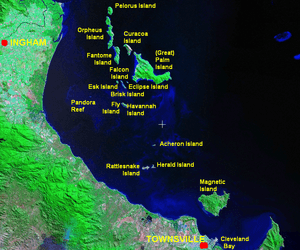Wulguru language facts for kids
Quick facts for kids Wulguru |
|
|---|---|
| Manbara | |
| Region | Townsville, Queensland |
| Ethnicity | Manbarra (Wulgurukaba) |
| Extinct | 1900?linglist |
| Language family | |
| Linguist List | qgu |
| AIATSIS | Y135 |
Wulguru, also called Manbara, was an Aboriginal language from Australia. It is now an extinct language. This means no one speaks it anymore. The Wulguru language was spoken by the Wulgurukaba people. They lived near what is now Townsville, in Queensland, on Australia's east coast.
Different types of Wulguru were spoken in the area. Some were heard around Palm Island. Others were used near Cleveland Bay. There were also many types spoken in Townsville.
Contents
What Kind of Language Was Wulguru?
Wulguru was part of the Pama–Nyungan language family. This is a very large group of Aboriginal languages. Wulguru was similar to other languages found along the eastern coast of Australia.
Sadly, the Wulguru language stopped being spoken a long time ago. This happened before experts could study it well. Because of this, we only have small pieces of information about it today.
Different Names for Wulguru
The Wulguru language had a few different names or dialects. These included Mulgu, Buluguyban, Wulgurukaba, Coonambella, and Nhawalgaba.
How Wulguru Sounds Were Made
Every language has its own special sounds. Wulguru had sounds like other languages, but also some unique ones.
Wulguru Consonant Sounds
Consonants are sounds like 'p', 't', or 'm'. Here are the main consonant sounds in Wulguru:
| Peripheral | Laminal | Apical | |||
|---|---|---|---|---|---|
| Labial | Velar | Palatal | Dental | Alveolar | |
| Stop | p | k | c | t̪ | t |
| Nasal | m | ŋ | ɲ | n̪ | n |
| Lateral | l | ||||
| Trill | r | ||||
| Approximant | w | j | ɹ | ||
Wulguru Vowel Sounds
Vowels are sounds like 'a', 'e', 'i', 'o', 'u'. Wulguru had three main vowel sounds:
- /i/ (like the 'ee' in 'see')
- /u/ (like the 'oo' in 'moon')
- /a/ (like the 'a' in 'father')
These vowel sounds could also be long or short. This means saying them for a longer or shorter time changed the word's meaning.
See also
 In Spanish: Idioma wulguru para niños
In Spanish: Idioma wulguru para niños
 | Delilah Pierce |
 | Gordon Parks |
 | Augusta Savage |
 | Charles Ethan Porter |


